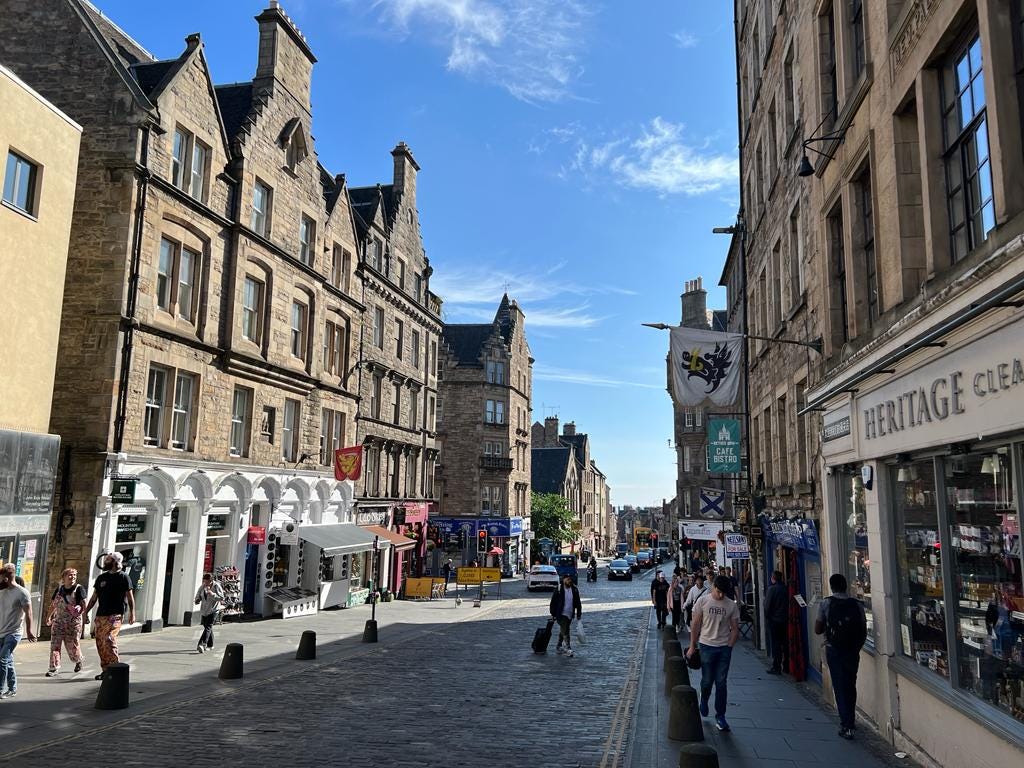'Tarred with an unfair brush and demonised'
As the council orders a review of its "quagmire" Short Term Lets policies, the debate is becoming entrenched and at times bitter
Louise Dickins is close to tears. “We’ve all been tarred with an unfair brush, and demonised” she says. “It is pretty hard for me to get my head around it.”
She has run a short term let business in Edinburgh for 25 years. She is just about as far removed from the media caricature “Airbnb” absentee landlord – leaving drunken stag parties to run amok and destroy quality of life for local communities – as it’s possible to imagine.
Louise represents the owners of 70 short-term let properties in Edinburgh. But she’s never used the Airbnb booking platform, not a single one of her properties has a key safe, and visitors arrive at her city centre office to collect keys for their “home-from-home.”
When she is caught up and suffers in the fall-out from tabloid headlines like “House of Hell” in a national newspaper just two days ago, she is confused. And so are a lot of other people.
TAKING THE FIGHT TO LAW
Arguments have raged over recent weeks and months over proposals to license pretty much every short-term let property in the city. Not because people in the sector were against licensing itself, indeed some were initially supportive, but because the system being introduced by City of Edinburgh Council appeared to operators to be designed to effectively drive them out altogether.
They felt so strongly they took the council to court – and were prepared to keep on fighting through the law. Late yesterday, the City of Edinburgh Council issued a statement that they were to review their Short Term Lets Policy and Conditions.
The announcement followed a Judicial Review judgement issued in early June, after proceedings a few weeks earlier brought by four operators who raised £305,000 in crowdfunding to finance their action. Court of Session judge Lord Braid found that significant parts of the council’s licensing policy were “unlawful.”
And the council faces a second Judicial Review, which will focus on the planning element of the process, and in particular its retrospective application within the city short term lets control zone. The council know that another negative finding for them risks holing their entire programme below the waterline.
Louise is one of the four petitioners who brought the first Judicial Review, and she is also a co-petitioner for the second. She believes the sector had no choice but to go to law and she dismissed claims the legal actions are undemocratic. “That is nonsense. If the legislation is not lawful citizens have every right to challenge it.”
OFFENSIVE LANGUAGE
She makes no apology, having also been a part of efforts to “reason” with the city council and the Scottish Government in her role as director of an industry body, the Association of Scotland’s Self-Caterers.
“After all we have been through in our sector, we have all been demonised, would I trust the council or government to deliver a fair solution more than the law? No, I’m afraid I would not, I would definitely trust more in our legal system. And if we have to, we will continue to challenge the council legally until a fair approach is taken.
“I find it very hard to get my head around it all. I’ve run a good business in Edinburgh for 25 years. I’ve operated properly and entirely legally, as a business, paying business rates, and had no issues with any of the properties. I don’t list on Airbnb – although plenty of good businesses do – and I don’t use key safes or let to antisocial crowds of people. I’d happily see irresponsibly-run ‘party flats’ driven out of the city. But I’m proud of the job I’ve done, and I don’t recognise much of the language being used about our sector, applied in such a sweeping manner, and some of it has been really offensive.
“All kinds of people need short-term lets – apart from holidaymakers we have people who are coming to the city for a new job, people hospital visiting, film crews, festival staff and performers, temporary workers, grandparents visiting their kids and grandkids, parents visiting their student sons and daughters. Lots of people don’t want, or can’t afford, to stay in hotels.
“The city needs a level of short-term lets to function, an elasticity in the accommodation. Visitors are essential to Edinburgh and to Scotland. You would imagine that the city council and government would be keen to engage with the sector to find a workable solution that satisfied all the city’s needs. To create a licensing system that aims to recognise good operators and get rid of the bad ones. Based on our experience so far, I’m not holding my breath.”
It’s not just the council that have failed to listen, she contends. Housing Minister Paul McLennan asked to meet Louise and some colleagues as the Scottish Government went about producing the legislation to introduce local authority licensing. “We put forward 14 proposals we felt would help create a fairer solution. He seemed interested and was keen to reassure us that they were listening. Every single one of our points was rejected by the Minister, every single one.”
LABOURING THROUGH A QUAGMIRE
Another operator, who wants to be known only as Duncan as he says he fears reprisals against his small business, is also perplexed at the “quagmire” processes that have been introduced.
He and his wife operate two small, one-bedroomed flats in the Old Town, and have operated for nine years. They do not qualify for the “grandfathering” opportunity that is afforded to those who have been operating for ten years or more, missing out by one year. They have never had a complaint made against either property.
He said: “We were in favour of licensing, we felt it would help protect the sector in the long-term given the increase in the number of people coming in with no real regulation, and the damage that was being done to the reputation of short-term lets.
“But we felt the licensing would be nuanced, and that there would be a system that would reward good operators and penalise bad ones. Instead, I’m labouring through a quagmire of a process and I know there’s a 99% chance I won’t succeed. It is loaded against granting licenses.
“I get the concerns around house shortages. I agree that we really need to be careful about the growth of short-term lets and its impact on the housing stock. But the city also needs some short-term accommodation, and it would surely be sensible to work out what level is required. I work in data, and some of the data I’ve seen around the number of short-term lets and the impact that the short-term lets sector might make on resolving the housing shortage is dubious to say the least.”
TWO SIDES TO EVERY STORY…
There is always another side to the story. In this case, the council and sector critics point to serious social problems which they say are exacerbated by the exponential increase in short-term lets. They say these issues will be reduced by their actions – anti-social behaviour in residential areas and a shortage of affordable houses that drives higher long-term rents for ordinary citizens. And in fairness, there is considerable public support for their view, with 88% of the 5500 who responded to their consultation supporting the introduction of licensing.
Inside Airbnb is a website that trawls the internet for Airbnb data and collates it (the giant global accommodation booking company claims inaccurately) and Inside Airbnb puts the number of “entire homes” (as opposed to a spare bedroom for example) being listed in the city at around 5300. As recently as this weekend, The Times was reporting that Inside Airbnb data recorded one listing for every four residential properties in the hotspot EH2 Old Town postcode. Arguments may rage over the accuracy of the data, but what is undeniable is that the numbers have grown exponentially in recent years. While specific data to confirm incidents of anti-social behaviour linked to short-term lets is almost impossible to find, in some parts of the city there has been considerable anecdotal evidence.
The critical problem of the shortage of housing, and especially affordable housing, in the city helps drive high selling prices and high rents and makes it all but impossible for many to access a safe, warm, dry home. A key commitment in the “City Plan 2030” is the identification of more than 100 sites to be used to build 37,000 new homes, with 20,000 of those affordable, by the end of the decade. That is an indication of the scale of the problem which needs to be fixed after years of failure to hit housing targets, and an Edinburgh Housing Summit held at the Scottish Parliament agreed that a big increase in funding will be needed to deliver the housing targets – in fact an increase of hundreds of millions of pounds.
Meantime the council’s policy on short term lets is so draconian, the sector says, that they are in danger of driving out the better operators. They are voting with their feet, and a list of short-term let operators who pay business rates in the city has reduced from around 1500 to around 1250 in recent weeks. And businesses support vital jobs.
TACKLING THE HOUSING SHORTAGE IS THE KEY
Also it has hardly gone under the radar or unreported that the council gained £3m from leasing a chunk of its own Old Town property to a luxury self-catering aparthotel at the same time that it is clamping down on smaller operators and trying to increase affordable housing stock. The “optics,” as they say, were not good.
Meantime Edinburgh, with the most expensive houses and highest rents in Scotland, has between 4000 and 5000 households living in temporary accommodation. Campaigners like the tenants’ union Living Rents maintain that Inside Airbnb data which indicates there are more than 5000 “entire homes” in the city available for short-term let could be used to house all the displaced households. The argument goes that if these short term lets were brought back into the housing stock, it would at least help ease some of the pressure.
Mike Williamson, a member of Living Rents, said: “I’m not interested in so-called party-flats. For me it’s all about the housing shortage and taking complete homes out of the potential housing stock. That’s why our slogan is ‘Homes Not Holiday Lets.’ I don’t care about people letting a bedroom, or for that matter their whole house when they go away on holiday, that’s fine.
“For me it is all about the shortage of housing that is driving high rents and high prices in Edinburgh that is making it almost impossible for a lot of people to get a home, and I believe bringing these entire homes away from being run as businesses and back into the housing stock would help.”
Positions have become entrenched, language often inflammatory and aggressive. Perhaps the Council’s planned review affords an opportunity to engage in a calm and constructive spirit. This is, after all, an administration that promises to “reset the relationship” with business. Deliver a licensing system which meets the needs of our city and our citizens, and it is a win-win. As Britain’s greatest political leader, Sir Winston Churchill, said: “Better to jaw-jaw than war, war.”






Thoughtful contribution to the debate. Hopefully a solution can be found that reduces the numbers and keeps the best of the operators.